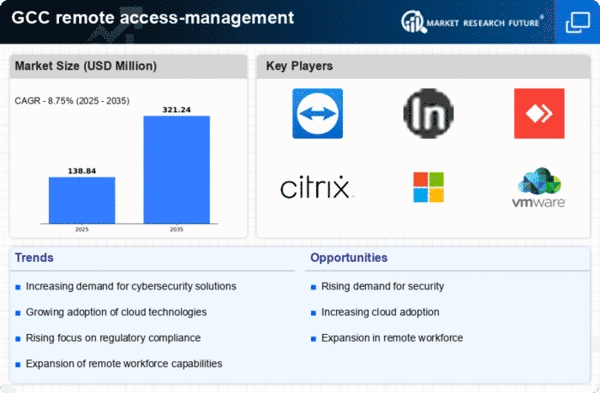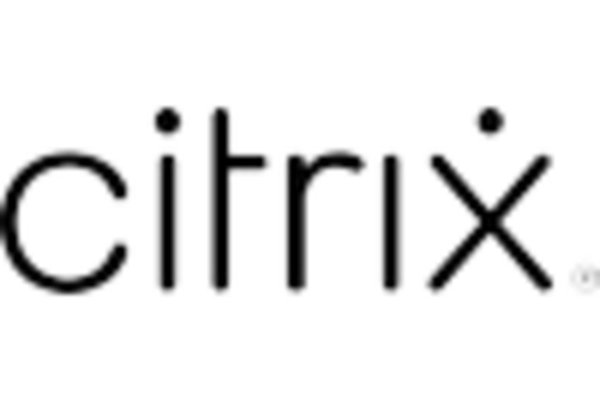Expansion of Cloud-Based Services
The proliferation of cloud-based services is significantly influencing the remote access-management market. As businesses in the GCC adopt cloud technologies, the need for effective remote access solutions becomes paramount. Cloud services facilitate seamless connectivity and collaboration among remote teams, thereby enhancing productivity. The remote access-management market is expected to witness a substantial increase, with cloud-based solutions accounting for approximately 60% of the total market share by 2026. This shift towards cloud integration not only streamlines operations but also provides organizations with the flexibility to scale their remote access capabilities in response to changing business needs.
Rising Demand for Secure Remote Access
The remote access-management market is experiencing a notable surge in demand for secure remote access solutions. Organizations in the GCC are increasingly prioritizing the protection of sensitive data as they expand their digital operations. This heightened focus on security is driven by the need to comply with stringent regulations and to safeguard against cyber threats. According to recent data, the market for remote access solutions in the GCC is projected to grow at a CAGR of 15% over the next five years. This growth is indicative of the increasing reliance on remote access technologies, which are essential for maintaining operational continuity and ensuring data integrity in a rapidly evolving digital landscape.
Growing Trend of Digital Transformation
The ongoing digital transformation across various industries in the GCC is significantly impacting the remote access-management market. As organizations embrace digital tools and technologies, the need for efficient remote access solutions becomes increasingly apparent. This transformation is driving investments in remote access technologies, with the market expected to reach a valuation of $1 billion by 2027. The emphasis on digitalization is fostering a culture of innovation, where remote access solutions are integral to enabling collaboration and enhancing operational efficiency. Consequently, businesses are likely to prioritize investments in remote access-management solutions to support their digital initiatives.
Increased Regulatory Compliance Requirements
The remote access-management market is being shaped by the growing emphasis on regulatory compliance across various sectors in the GCC. Organizations are compelled to implement robust remote access solutions to adhere to regulations such as data protection laws and industry-specific standards. This trend is particularly evident in sectors like finance and healthcare, where compliance is critical. As a result, the demand for remote access-management solutions that ensure compliance is expected to rise, potentially increasing market revenues by 20% over the next few years. This focus on compliance not only mitigates risks but also enhances the overall security posture of organizations.
Adoption of Advanced Authentication Technologies
The integration of advanced authentication technologies is becoming a key driver in the remote access-management market. Organizations in the GCC are increasingly adopting multi-factor authentication (MFA) and biometric solutions to enhance security measures for remote access. This trend is indicative of a broader shift towards more secure access protocols, as businesses seek to protect sensitive information from unauthorized access. The market for advanced authentication solutions is projected to grow by 25% in the coming years, reflecting the critical role these technologies play in fortifying remote access management. This evolution not only improves security but also instills greater confidence among users.
















